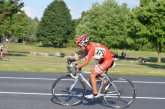IL7 signaling enhanced CAR T cells to treat pediatric solid tumors

Mentor Name: Andras Heczey
Recent advances in genetic engineering have enabled the development of a new strategy to reprogram special white blood cells, called T cells, to effectively destroy tumors. This is achieved by inserting new genes, called chimeric antigen receptors (CARs), into T cells that equip them to recognize, proliferate in response to, and subsequently destroy tumors. This approach has been very successful in children with certain blood cancers and has the potential to help children with solid tumors as well. However, engineered T cells have so far generated limited responses in patients with solid tumors. A key molecule, called interleukin-7 (IL7), is absent in the tumor microenvironment, and the receptor which is responsible for capturing IL7 and transmitting the signal into T cells is downregulated; thus, even in the presence of IL7, the signal cannot be transmitted into T cells.To overcome this challenge, we propose that T cells will require additional manipulation that enables the IL7 signal to be transmitted, ultimately inducing sustained cancer cell killing and T cell expansions until the tumor cells are gone. We designed, synthesized, and expressed new IL7 and IL7-receptor molecules linked together and expressed this fusion protein (IL7FP) in T cells to measure their ability to maintain cancer-antigen dependent killing and CAR T cell growth in established preclinical models. We will test both our GPC3-CAR and GPC3-CAR T cells co-expressing IL15, another unique cytokine important for T cells. We hypothesize that IL7/IL7R module will provide distinct signal compared to IL15 and induce the expansion of less differentiated CAR T cells with more proliferative capacity and ultimately higher antitumor potential.

